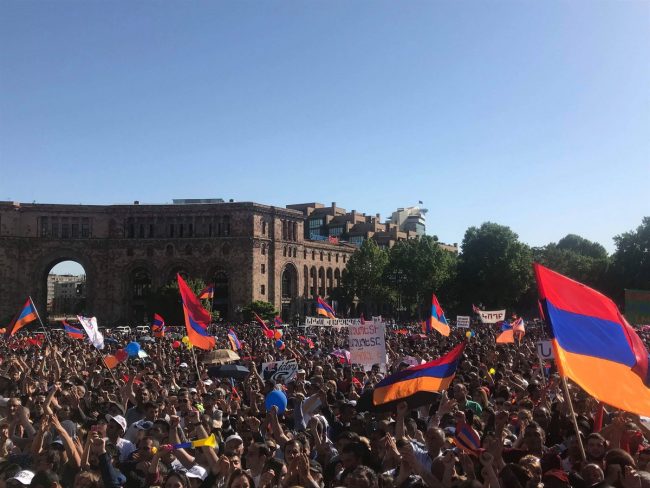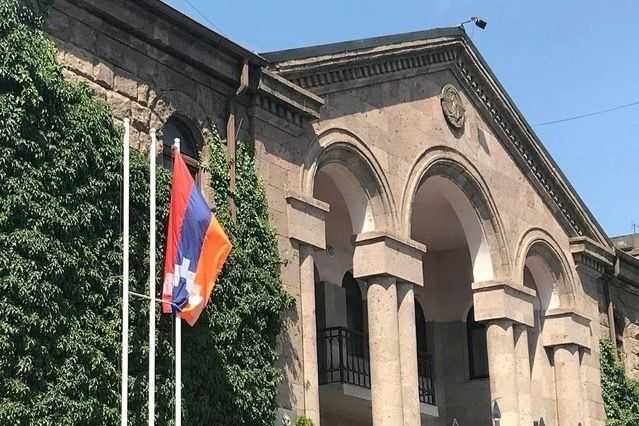

 Armenia’s parliament, the National Assembly, has failed to appoint a new prime minister. Opposition leader Nikol Pashinyan gained the votes of 45 MPs, with all three opposition factions supporting him, but 56 MPs voted against him. He failed to win a majority after the ruling Republican Party voted against him, despite earlier vowing not to block his appointment.
Armenia’s parliament, the National Assembly, has failed to appoint a new prime minister. Opposition leader Nikol Pashinyan gained the votes of 45 MPs, with all three opposition factions supporting him, but 56 MPs voted against him. He failed to win a majority after the ruling Republican Party voted against him, despite earlier vowing not to block his appointment.
Factions in parliament will now have a week to again nominate candidates for PM, before attempting again. If parliament fails to appoint a prime minister this time, parliament will be dissolved and snap elections called.
Tens of thousands of supporters of Pashinyan gathered in Yerevan’s Republic Square on Tuesday to await the vote in parliament, following weeks of anti-government street protests.
During his speech in parliament prior to the vote, Republican Party faction leader Vahram Baghdasaryan announced that the Republican Party would not be voting for Pashinyan. ‘The greatest mission of a politician is to be careful and patient. I want you to believe that ultimatums, expletives are not the way to take political decisions’, EVN Report cited him as saying.
In his own speech following this, Pashinyan said that ‘a force that is against its own people cannot exist. What we witness now is not [the Republican Party] or faction, but its ghost. There can be no second opinion here’, CivilNet reported.
Pashinyan was the only candidate nominated for the post of prime minister and was endorsed by the three opposition factions in the National Assembly, the Yelk (Way Out) Bloc, Gagik Tsarukyan’s Prosperous Armenia, and the Armenian Revolutionary Federation, prior to the election.
The Republican Party holds a majority of 58 seats of 105 in the National Assembly, while, Pashinyan’s Civil Contract party, a member of the Yelk, has only three. However, in the days before the vote, Pashunyan secured the support of all opposition parties in parliament, who together hold 47 seats.
On Sunday, the Republican Party declared that it would not try to prevent ‘the people’s candidate’, referring to Pashinyan, from being elected, and would not boycott the appointment. The statement followed a meeting earlier that day with Pashinyan, who has been leading the anti-government protests.
On Monday evening, Pashinyan announced on his Facebook page that he had information that the Republican Party would still try to prevent him from becoming prime minister, despite their promise, and called for a rally on Tuesday morning on Yerevan’s Republic Square to coincide with the vote on a new PM in the National Assembly.
A ‘Velvet Revolution’
Small protests loosely organised around the slogan ‘No to Serzh’ began in March. Since 13 April, tens of thousands have come out to the streets daily in what Pashinyan has called a ‘velvet revolution’. The protests were initially limited to opposing former president Serzh Sargsyan’s appointment as prime minister, but their demands later expanded to include a new government from outside the ruling Republican Party, and new elections to be held under a new electoral code.
OSCE observers noted that the previous parliamentary elections, in 2017, were ‘tainted by credible information about vote-buying, and pressure on civil servants and employees of private companies’.
Following constitutional changes passed in 2015, Armenia’s parliament, the National Assembly, is now in charge of electing the prime minister. With Armenia’s shift from a semi-presidential to a parliamentary system, the prime minister is the most powerful position in the country.
Having previously played down suggestions he would run again for political office, Sargsyan, having served the maximum 10 years as president, announced on 11 April that he would seek the position of prime minister. On 17 April, he was sworn in as PM by Armenia’s parliament, the National Assembly. He resigned on 23 April after 11 days of protests.







